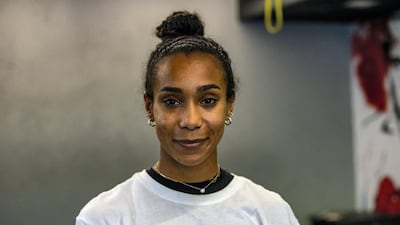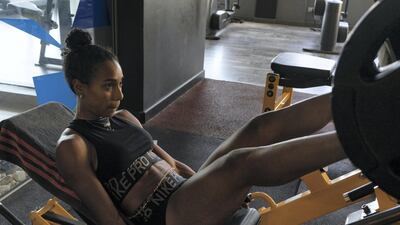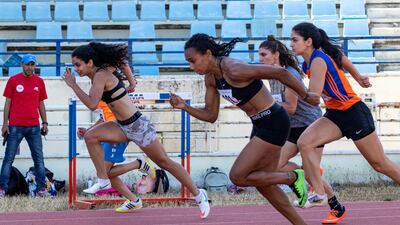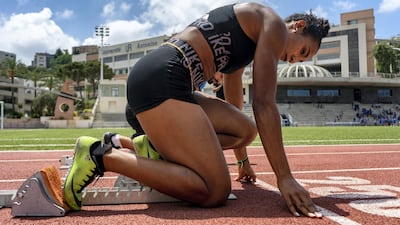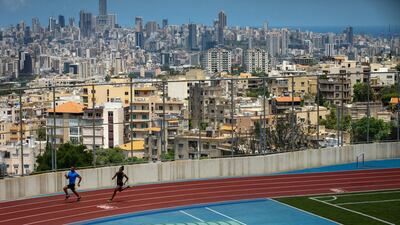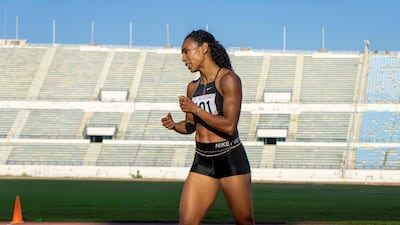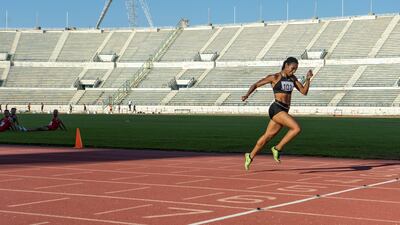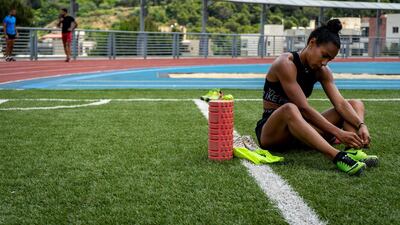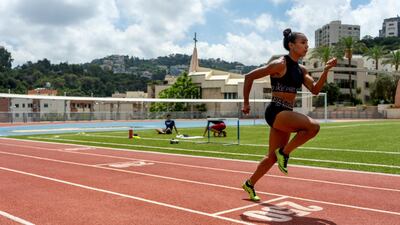As part of our build-up to the Tokyo Olympics we will be profiling Arab athletes and para-athletes as well as those from the Mena region hoping to make it to this summer's Games
Running at full tilt, Aziza Sbaity leaned forward and glided across the finish line inside the Camille Chamoun Stadium in Beirut the same way she had done so many times before – in first place and well ahead of her competition.
It was a strong finish and an easy 200 metre win. As the other runners came in, Sbaity had already turned and headed towards the timekeeper’s table.
The officiator looked up from his laptop and announced her time – 23.9 seconds. Sbaity was overjoyed. She jumped, pumping her fists in celebration and collecting high-fives and hugs from the other runners. It was a new personal best, and the first time Sbaity had ever run the 200 metres in under 24 seconds.
But was it enough?
Sbaity is the fastest woman in Lebanon, and holds the records for the women’s 100m and indoor 60m and 200m. As the rankings stand she has a strong chance of representing Lebanon at the Tokyo Olympics this summer.
On Saturday, Sbaity ran an even faster 200m, finishing in 23.77 seconds in Montpellier, France. As impressive as this is, she is just under a second shy of the automatic qualifying standard for the Olympics and her personal best in the 100m (11.73) is over half a second short as well.
Lebanon has been allocated one ‘universalist’ place at the Olympics – reserved for the ‘best’ athlete not to have made the cut-off times. Sbaity is competing for this single spot with other runners, a place to be allocated by the Lebanese Olympic Committee (LOC) by the end of this month.
With just a few meets left to compete before the qualifying deadlines, the sprinter is in her best form, knowing that competing against elite athletes in favourable conditions could dramatically improve her performance.
"We are now just counting down the races, it's so intense," Sbaity told The National a few days after her run in Beirut at the Université Antonine track, where she was practising her sprint start.
“My goal is to break the 200m record by a large margin, which I am sure I can do. That would put me in a really good position.”
Sbaity is meticulous as she measures out and sets up her starting blocks by hand. The most important aspect of a sprint race is getting a powerful start that allows for rapid acceleration.
Sbaity has always been a strong starter; within her first year of competitive running in 2009 she won the 100m and 200m at the Lebanese National Championships.
This sealed her place in the Lebanese team for the Jeux de la Francophonie games which were hosted in Beirut later that year.
“The opening ceremony got me,” Sbaity said. “I remember going through the tunnel coming into the stadium, and it was lit. You could hear the sounds of the crowd outside. As the host country, we were the last to walk out. It was such an emotional moment for me, I couldn’t believe I was representing my country."
From that moment she was hooked; Sbaity knew she wanted to represent Lebanon.
However, after what was an impressive start to her career, Sbaity was hindered for several years with hamstring syndrome, a painful condition that took several years to properly diagnose. The pain prevented her from being able to make progress in her speed; between 2010 and 2014 she failed to improve on her times.
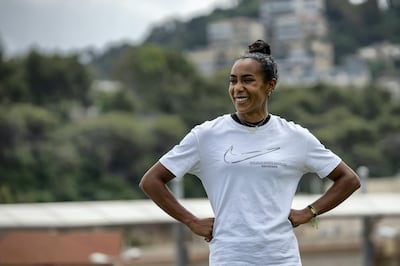
Despite this, Sbaity continued to battle for her place at international events, representing Lebanon at the World Championships in Beijing (2015) and World Indoor Championships (2014 and 2016).
It was then in 2018 when Sbaity decided to take things up a gear. After a period of transition; finishing university studies and ending a long-term relationship, she decided to focus solely on running, setting her sights on Tokyo 2020.
“I said to myself, ‘OK listen you're doing this and putting all this time and effort [in], at least let your goals be very clear,’” she said. “I had to get out of that box of ‘maybe I can't do this.'”
With the support of her family, Sbaity put the career to one side and dedicated herself full-time to running.
The results started to show. That year she broke the Lebanese record for the 100 metres, then improved on that result in 2019. She has since picked up the records for the indoor 60m and 200m, and outdoor 300m and 4x100m.
As the Tokyo games were delayed a year, Sbaity has made the most of the postponement to push herself to run harder and faster. Now, just weeks away from the Olympics, she is undoubtedly in her prime at 29.
As well as her new 200m personal best in France, she recently shaved off half a second from the indoor 200m record in Turkey in February.
“If I am improving, I am improving for Lebanon,” she said.
While it is clear how much Sbaity loves her country – and she could well be the one to represent it at the Olympics – her experiences as a black Lebanese woman make her feel she does not belong.
Since fleeing war-torn Liberia to come to Lebanon as a child, Sbaity has experienced racism and prejudice all of her life.
When she was just six years old, on a trip to a public swimming pool with her mother, she was denied entry to the pool because she was black and therefore presumed to be the daughter of a migrant domestic worker.
Lebanon has a population of around 250,000 migrant domestic workers, many of whom come from African countries. Their status in the country is regulated by a set of immigration laws that tie workers’ legal residency to their employer. Under this system, some workers have faced exploitation and abuse.
Since the Black Lives Matter movement captured global attention last year, Sbaity has been a lot more vocal about injustice, using her platform to speak out against racism in Lebanon.
Sbaity feels it's important to use her platform to discuss these issues. As much as she doesn’t experience the abuse as she used to, she believes she has the freedom to speak out about racism, where others do not.
“It's so degrading, so annoying, and it doesn't hurt me anymore at all. I just feel so sad for the people who will be hurt from that. And that's why I am vocal about it, I’m not afraid to call it out when I hear it.”
If Sbaity does get chosen for the Olympics, she will be the first black Lebanese athlete to represent the country at the games.
“Lebanese people can do anything, whatever their religion or colour, people are just people. I think my goal is not just for myself. If I am doing something, I hope someone gets inspired from my journey and thinks 'yes I can do this too' and maybe do even better.”
